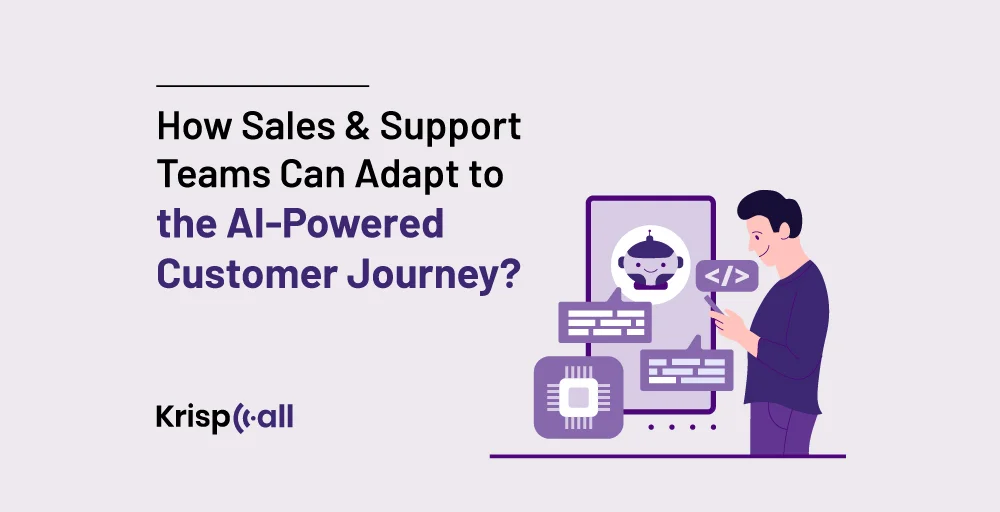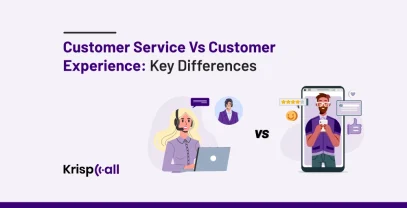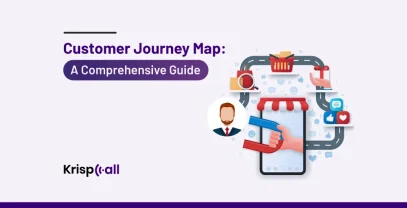Today, customers expect a seamless and personalized experience at every touchpoint. But the question here is – Can your sales and support team meet the customers’ expectations.? If not, then the answer is – implementing AI in your business sales and customer support process.🤩
Tracking every individual customer’s journey manually can be exhausting 😩. However, with the development of AI, it has become possible to obtain real-time data and insights. AI can help identify customer needs, resolve their queries quickly, and provide them with personalized solutions. This, in turn, can help sales and support teams focus more on vital tasks.
👉 In this blog, we will discuss what AI is exactly in sales and support, its benefits, and how you can adapt an AI-powered customer journey in sales and support teams.
🔑 KEY HIGHLIGHTS
- AI-powered customer journey integrates AI in every stage of the customer in all touchpoints.
- AI in sales uses artificial intelligence technology to optimize several sales processes and activities.
- AI in support uses artificial intelligence technology to automate customer service processes.
- The benefits of using AI in sales and support include increased efficiency, streamlined workflows, personalized customer experiences, and more.
What is AI in Sales & Support?
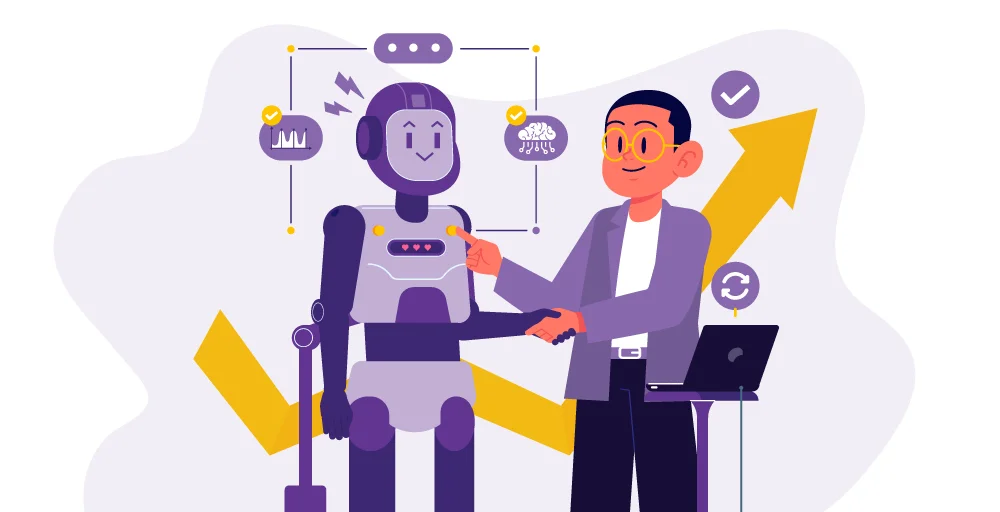
Let’s break down AI in sales and support into smaller parts to understand it better.
AI in sales: AI in sales, commonly known as sales AI, uses artificial technologies to optimize several sales processes and activities. This is done using technologies like machine learning, natural language processing (NLP), smart automation, and more, helping the sales team get closer to their goals.
Similarly, AI in sales automates repetitive tasks, helping sales teams focus on more important tasks that require creativity and problem-solving.
Here are some key ways AI is helping in sales:
- Lead generation and scoring.
- Personalized outreach.
- Sales forecasting.
- Analyzing sales calls.
AI in support: AI in support is a way of using artificial intelligence in customer service and technical support settings. It allows you to identify customer pain points, deliver personalized customer experience, and significantly automate time-consuming and repetitive tasks.
Furthermore, using automated chatbots and virtual phone assistants allows businesses to solve general customer queries. This reduces customer wait times and helps to solve customer queries faster.
Here are some key ways AI is contributing to support:
- Automate repetitive queries.
- It saves time and increases the agent’s productivity.
- Personalized recommendations.
- Automatically collects relevant information.
Benefits of AI in Sales and Support Teams
Integrating AI in sales and support teams offers several benefits. Let’s have a look at the key benefits:
1. Increased efficiency
AI continuously helps sales and support teams to enhance efficiency through several means. It automates repetitive tasks like data entry and qualifying leads. This eventually saves time and effort, allowing your team to concentrate on more crucial tasks.
For instance, AI can analyze customer interactions and identify customer sentiment. This enables automated chatbots to determine customers’ tones (positive, negative, and neutral) while interacting. With this data, the agent will know which approach to take with customers. This leads to increased efficiency and contributes to effective customer service.
2. Personalized customer experiences
Your sales and support teams might know how to add a personal touch while interacting with customers. But with AI, you can tailor your conversation even before receiving the call.
AI provides agents access to customer history, including past interactions, purchases, and complaints. This information allows agents to focus directly on solving customer issues. When businesses make customers heard, addressing their needs and preferences facilitates positive responses, which leads to increased sales and customer satisfaction.
3. Automated communication and follow-ups
AI makes it easier to automate mundane tasks such as using AI outreach tools for email, appointment scheduling, and follow-ups. On the other hand, AI automatically responds to common queries, handles simple tasks, and follows up with leads and support tickets. This enables the agents to focus on complex interactions, reducing average handle time and increasing customer satisfaction.
4. Access data-driven insights
AI’s algorithms are powerful enough to analyze customer data and pinpoint meaningful information about customer behavior, preferences, and patterns. This assists in identifying a good lead, customizing their sales pitch, and designing an effective sales strategy.
In addition, the customer service team can utilize this data to respond to customer inquiries on time, identify client needs, and provide excellent customer service.
5. 24/7 customer service
AI chatbots work 24/7 as they do not depend on any time zone or business hours. Out of business hours, customers can chat with the chatbot and gain essential information without speaking to agents. This will solve their problem, leading to higher customer satisfaction and retention.
What is an AI-powered Customer Journey?
An AI-powered customer journey is a combination of AI in every phase of the interaction of customers with a company. The customer journey starts with the early stage of product or service awareness and covers all the stages until the post-purchase support and advocacy.
Here’s how AI can play a role in each stage of the customer journey:
- Awareness: AI continuously analyzes customer data and contributes to creating a more effective targeted marketing campaign.
- Consideration: AI analyzes customers’ needs and past conversations and suggests products and services that consider customers’ interests.
- Purchase: Chatbots and virtual assistants can help you purchase by offering personalized product recommendations. They also allow you to compare products and offer real-time support.
- Retention: AI can help businesses retain customers by identifying patterns and anticipating their needs, allowing personalized communication and loyalty programs.
How to Adapt AI-Powered Customer Journey in Sales & Support Teams?
By implementing the following strategies, you can empower both your sales and support teams with a seamless and personalized customer experience:
1. Leverage chatbots for 24/7 support
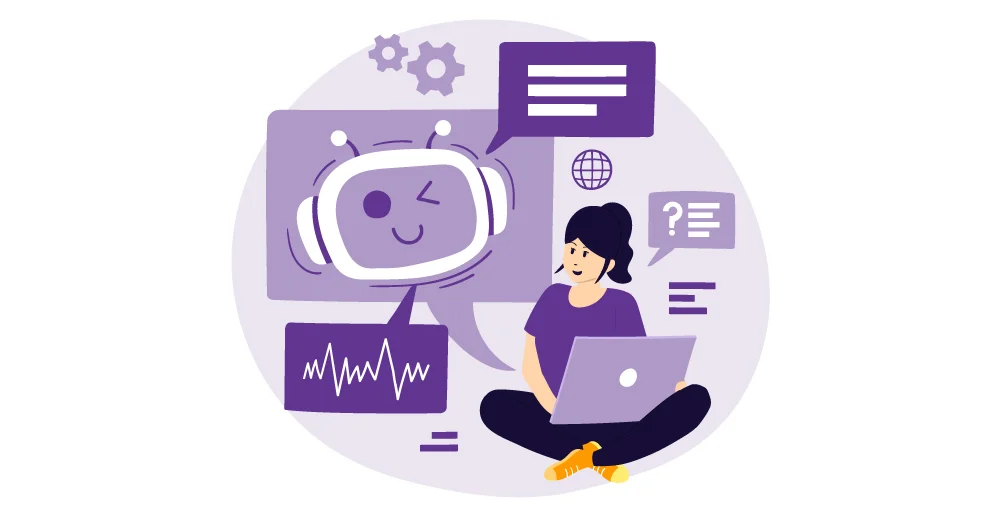
Businesses can now provide 24/7 support with the help of chatbots. These chatbots are pre-programmed with essential information that customers mostly need. In addition, chatbots can resolve basic customer queries and troubleshoot simple problems. Ultimately, customers can chat with chatbots and gain essential information.
2. Personalize product recommendation
No wonder agents are unable to recommend products without talking to customers. But AI can recommend perfectly fit products that lead to unique needs and preferences. This is possible due to AI analytics capabilities that analyze customer data based on previous records.
3. Automate lead scoring and qualification
Agents spend most of their time searching, qualifying, and identifying possible leads. On the other hand, AI evaluates the likelihood of conversion based on elements like engagement and actions. AI-powered lead scoring helps sales teams be faster and more efficient and facilitates identifying new market opportunities, fine-tuning targeting strategies, and optimizing sales activities.
4. Sentiment analysis

A proactive understanding of customer sentiment is important in building strong customer relationships and resolving problems promptly.
AI can easily evaluate customers’ sentiments from text using reviews, feedback, or voice interactions like phone calls or recordings. Real-time sentiment monitoring supplies sales and support groups with information regarding possible problems, trends, and improvement areas.
5. Automate routine tasks
One of AI’s key strengths is its ability to automate time- and resource-consuming mundane tasks. AI can be applied to various tasks of the sales and support teams.
This includes filling out forms, scheduling appointments, generating reports, and following up with clients. Additionally, the efficiency of such tasks performed by AI-empowered systems frees the staff to work on more strategic assignments that require creative and analytical skills.
6. Personalize marketing campaigns

AI allows sales and marketing teams to create highly targeted and personalized marketing campaigns that are relevant to their clients on a personal level.
Businesses could segment their customers using demographic information, preferences, past buying history, and engagement levels, relying on customer data and AI computing technology. Furthermore, segmentation enables marketing to deliver customized messages, deals, and content based on customers’ particular needs and interests.
7. AI-powered self-service
AI-enabled knowledge management systems help customers find answers themselves. These systems examine huge knowledge databases, including FAQs, articles, tutorials, and troubleshooting guides, through Natural Language Processing (NLP) and Machine Learning Algorithms (MLAs).
Intuitive search functionality and interactive chatbots allow customers to locate the relevant information and resolve the issues at their own pace without any human assistance.
8. Predictive analytics
AI-empowered predictive analytics scans sales and supports prospects so they can detect customers’ behavior and needs in advance. Using historical data and pattern recognition, AI algorithms can predict future trends, attributes, and demands.
In addition, companies could interact with customers more personally, provide relevant products, and structure their sales and support strategies based on advanced knowledge.
Conclusion: Enhance your Journey to Customer Retention and Sales With AI
Integrating AI tools into sales and support is no longer a question of whether or not; rather, it is a matter of creating a customer-oriented environment.
Today, sales teams can automate, personalize, and perform using AI systems-powered tools. This is how they achieve greater revenue. On the other hand, a support team may add to the customer experience by offering timely and qualified help, resolving problems immediately, and hence earning long-term loyalty.
Moreover, implementing AI permits both teams to adjust to fast-changing customer journeys, equipping them with the skills to provide memorable experiences that surpass customer expectations.

